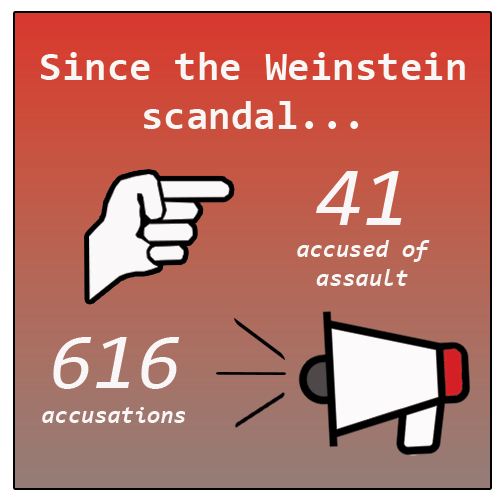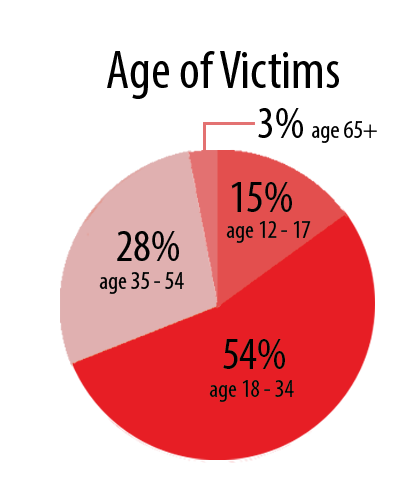Weinstein effect exposes dark secrets
Hollywood scandal sparks international outcry
December 7, 2017
Sexual assault scandals like the one regarding renowned film producer Harvey Weinstein are continuing to surface, empowering many victims to come forward with personal stories of sexual abuse or misconduct by highly publicized and powerful personalities. Over the past couple of months, Weinstein has garnered over 60 accusations of making unwanted sexual advances toward both men and women. Shortly after Weinstein was implicated, sexual misconduct allegations regarding other eminent figures such as Kevin Spacey, Ben Affleck, Roy Moore and Matt Lauer materialized. This ripple of sexual assault accusations has been dubbed the “Weinstein effect.”
While sexual assault cases emerge in the media frequently, the Weinstein incident is considered a tipping point due to the large number of people he victimized. Allegations against Weinstein are of varying levels of harassment and include cases ranging from the 1970s to the present day.

These cases came to light in October 2017 as a result of an investigation conducted by The New York Times. The accumulation of the accusations legitimized the claims and left few opportunities for Weinstein to defend himself. Weinstein’s ability to shield his predatory behavior from the public has astounded millions, but his behavior proves that sexual assault in workplaces is a recurring dilemma. It also delineates a major communication disconnect, as a staggering number of men and women were assaulted, yet Weinstein still diverted the public eye from his behavior; his conduct signifies that the issue constitutes more than a few isolated incidents. An increase in awareness of the toxicity of the workplace culture as a result of his unethical behavior influenced a subsequent wave of victims to come forward with allegations of sexual harassment against other prominent figures as well.
“I think [the women who stepped forward about Weinstein] were able to reveal how common sexual abuse or assault is,” said sophomore Sarah Sotoudeh, the vice president of Intersections, a social justice club on campus. “Because a lot of women feel ashamed about being abused or assaulted, when they see that someone else has said that [they have been sexually abused or assaulted before], it has value because it makes it more okay to speak out, even though it should always be okay,”
To many people, the Weinstein incident substantiated the gravity of speaking out about sexual assault. For many actors and actresses, accusatory claims with little to no evidence could end their careers, as Weinstein and others like him hold powerful positions in the Hollywood industry, and the rebuttal would be immensely risky.
“Many victims do not report their stories due to shame or the fear that no one will believe them — that they will be fired or scapegoated,” said Debra Gionet, a licensed clinical social worker. “Essentially, they fear the ramifications. It is degrading, objectifying and abusive to the victims. It demonstrates complete disregard for a victim’s personhood and sense of self-efficacy.”
 Those who did attempt to speak out were quickly silenced by “undisclosed settlements,” or large sums of money from Weinstein to keep them from publicly outing him. Many of Weinstein’s victims still have not shared details of their grievances, as the papers that they signed years ago prevent them from doing so. Recently, however, eight undisclosed settlements have been reported by anonymous employees of The Weinstein Company.
Those who did attempt to speak out were quickly silenced by “undisclosed settlements,” or large sums of money from Weinstein to keep them from publicly outing him. Many of Weinstein’s victims still have not shared details of their grievances, as the papers that they signed years ago prevent them from doing so. Recently, however, eight undisclosed settlements have been reported by anonymous employees of The Weinstein Company.
“With the undisclosed settlements, it’s this man who’s in power, and the women may be in a vulnerable place, making it harder for them to speak out,” said Sotoudeh. “In the past, [Weinstein] hasn’t been called out, or people haven’t taken allegations against him seriously because of his position in the industry and his position in society as a man.”
These recurring cases exhibit the dominance of power and money that has overridden justice for sexual harassment victims. These victims have been denied safe working conditions and fair treatment because of their financial or societal status. They may not feel safe publicizing or sharing their grievances to receive the justice that they deserve, as they may be in a vulnerable or unsafe position to expose themselves.

However, the words of highly publicized actors or actresses are heard by many ears. When prominent Hollywood figures such as Angelina Jolie, Gwyneth Paltrow and Ashley Judd have also came forth with harassment allegations, they were able to make a bigger difference due to their established fan bases. After seeing the lives of these celebrities on television or in news articles so often, the public may be inclined to feel more intimate with them and find them to be more credible. Additionally, people tend to find figures who are already well-established in the industry more believable than figures who become famous by accusing someone of sexual assault. As the Weinstein incident continues to unfold, other powerful public figures have been dethroned from their positions as well. Two prime examples are Michael Oreskes, head of news at National Public Radio (NPR) and Jeff Hoover, Kentucky’s Speaker of the House. More recently, Olympic gold-medalist Aly Raisman came forward with sexual assault claims against Team USA’s doctor, Larry Nassar, who is now standing trial and may be sentenced for up to 60 years in prison. Matt Lauer, a host on the Today show, has also been fired after a colleague came forward with claims of sexual misconduct. As a result of such reports, corporations in all fields are taking swift action, severing ties and firing figures accused of sexual misconduct, such as Matt Lauer and actor Kevin Spacey.

“I hope that Hollywood and other famed centers of power will weed out all elements of sexual harassment, abuse and taking advantage of those with less power,” said Gionet. “These strongholds need to be exposed and dealt with according to the statutes and laws in place.”
While the Hollywood industry is a high-profile example of sexual harassment becoming an increasingly prominent societal issue, systematic sexual assault is experienced by approximately one in four women, according to the Connecticut Alliance to End Sexual Violence.
“Since Hollywood has great power across state, national, ethnic, age and socioeconomic lines, there will be some notable shift in the micro-culture of Hollywood that impacts the macro-culture even abroad,” said Joanne B. Kim, a Marriage and Family Therapist Intern (OliveMeCounseling.com). “This is a call to action to all of us to use the resources and power we have to serve those in need.”
The recent flood of allegations against numerous prominent Hollywood figures marks only the beginning to the resolution of a larger underlying societal problem, which may require a painstaking and gradual process in order to see large-scale reform. Until sexual harassment stops being the cultural norm of Hollywood and other industries, people with less power will continue to be targeted and victimized.





























































